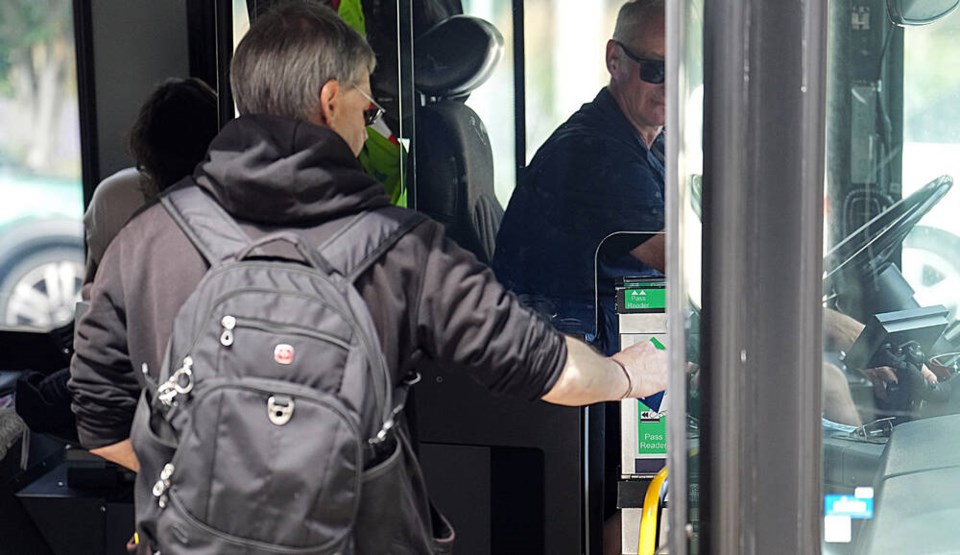Uniformed transit supervisors stand near the fare box and watch as people scan their phones or UMO cards or pay cash.

Uniformed transit supervisors have been deployed to bus routes and stops throughout Greater Victoria to crack down on fare evasion this week, but they’re starting with education before potentially moving on to penalties, says B.C. Transit.
The supervisors stand near the fare box and watch as people scan their phones or UMO cards or pay cash.
The campaign, which is expected to continue, was launched this summer because of a recentspring fare increaseand the fact that it’s beennearly two years since the UMO digital fare systemwas implemented, said B.C. Transit communications manager Tessa Humphries.
On April 1, bus riders in the capital region started paying $3 for a single bus ride, up from $2.50.
“There are a lot of costs associated with running a transit system, and we want to ensure our riders know their fare-payment options and that they are paying the correct fares,” Humphries said.
She said the campaign will focus first on educating riders, although it could become more enforcement-focused down the line. But that will only happen once supervisors have collected data indicating the frequency of fare evasion, Humphries said.
Penalties could include having fare products deleted on mobile devices or having accounts suspended, she said.
Riders so far have been courteous toward the supervisors, and some customers have said they appreciate the campaign, she said.
Humphries acknowledged that some people struggle to afford transit, noting that B.C. Transit partners with “several organizations” to support individuals who are not able to pay their fares.
Free passes are provided to those 18 and under in the city of Victoria through a municipal subsidy, and to low-income clients of social agencies through the Low-Income Transit Assistance Program. Under the latter program, B.C. Transit provides discounted passes to the Community Social Planning Council, which makes them available at a 50 per cent discount to its partners, so they can hand them out to clients in need.
Under the province-wide B.C. Bus Pass Program, low-income seniors and people with disability designations can get free bus passes, while the Get on Board program offers free transit for those age 12 and under on all B.C. Transit and TransLink services.
Christina Clemente, chair of the Victoria Transit Riders Union, said she was disappointed to hear about the enforcement program, since the systems in place to help those who can’t afford their fares are often limited and difficult to access.
“The people who take the bus are often the most vulnerable people in society,” she said.
She said her group wants to see free transit for everyone in the province, but especially for youth and seniors who are most reliant on the service.
Clemente said funds allocated for fare enforcement should instead be used to improve transit services, noting that research in the U.S. has found such campaigns are ineffective and only serve to stigmatize people who can’t afford the bus.
She said framing the campaign as educational is condescending, arguing riders who attempt to avoid fare payment are often well aware of how it would work if they had enough money to participate.
Clemente said some transit operators who belong to her group worry the enforcement program will cause distractions and delays, as well as “moral distress” from watching difficult interactions.
Humphries said she has been hearing that operators have appreciated the presence of the supervisors in the past few days, adding the program “assists them to focus on their regular duties.” She said no delays have been reported so far.
[email protected]